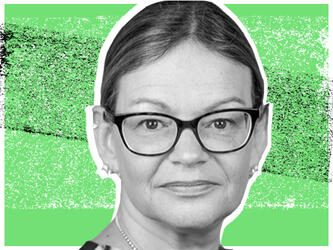Winners and losers
![]()
In marketing academic Scott Galloway’s latest book, The Four: The Hidden DNA of Amazon, Apple, Facebook and Google, he posits the view that the Big Four have amassed “unprecedented power” and that analysts are now “marinating in data”. In stock-market terms, the market capitalisations of these tech giants represent the biggest transfer of value – from established businesses to new entrants – in the history of the stock market.
Scott says “Google is God”, and notes that one in six questions asked of it has never been asked before. It uses the information it finds to take intelligence to the next level. Google updates itself immediately, and the more people use it, the better it gets for everyone. Revenues are growing, but the cost per click is going down – which offers a compelling proposition whereby the product gets better, yet keeps getting cheaper.
Moving on to Facebook, Scott describes it as “Love”, because it is used to create more empathy and has become the new religion. Judging by user growth, Facebook is the most successful thing in the history of the world. It has amassed 2bn monthly active users since it was founded in 2004. By contrast, the Catholic Church has 1.29bn members and it has been going since the 1st century.
When it comes to competition, Scott expects Facebook “to wipe Snapchat from the face of the world”. He notes that Instagram Stories is already overtaking Snapchat, while Snapchat features are rapidly being developed across the businesses of Facebook.
Turning to Amazon, Scott views the company as “the digestive tract”, which is effective at “sorting out stuff”. In the US, 58% of households have Amazon Prime, its paid subscription service that – for a monthly or yearly fee – gives users access to free two-day delivery, streaming video/music and other benefits. This has enabled Amazon to invest in adjacent businesses such as entertainment, where it will spend $4.5bn on content this year – more than any of the traditional networks and second only to Netflix.
Put simply, Amazon “can overwhelm any competitor with brute force”. Scott views it as “the antichrist of retail” and says it is now going after the consumer packaged goods (CPG) companies. Amazon takes every dollar and reinvests it, running at break-even so it has huge capacity for innovation and growth.
Finally, “Apple is sex” and Scott believes the brand is used to signal power, wealth and taste. In his view, it should be seen as a luxury – not a technology – brand. For example, the high margins of Apple are like those of Hermes and Ferrari. People don’t think with their brains when they buy Apple. The company’s products are at a premium price, yet it has the highest market share – a highly unusual position. The decision to launch its own stores was a stroke of genius, as these act as “temples to the brand”.
To the chagrin of the traditional players, Facebook and Google delivered 103% of the growth in the online advertising industry in 2016. Scott remarks that great power brings responsibility, but Facebook and Google have brought negligence and “they have let us down” in terms of fake news and allowing inappropriate material on their websites. This has created an unsafe brand environment, where an ad can plant itself directly next to paid content featuring a preposterous headline such as ‘WikiLeaks confirmed Hillary sold weapons to Isis’.
Turning to the big advertisers, Scott states that Unilever needs to cut media investment spending by 5-10% per year for the next three years, but “it wouldn’t miss this” because it can optimise using technology. However, Amazon is rapidly moving to build its own private label – for example, in batteries – and steers consumers to these products when they are using Alexa voice search. The group is developing Amazon private label to offer generic product at much lower cost.
The future belongs to the fast, not to the big. Scott observes that 90 of the top 100 brands in the US lost share last year, but he sees the big brands getting hurt by Amazon starting to fight back. Let’s hope he’s right.
Lorna Tilbian is former executive plc director and head of media at Numis Securities. Her non-executive board positions include Euromoney, M&C Saatchi and Rightmove.

We hope you enjoyed this article.
Research Live is published by MRS.
The Market Research Society (MRS) exists to promote and protect the research sector, showcasing how research delivers impact for businesses and government.
Members of MRS enjoy many benefits including tailoured policy guidance, discounts on training and conferences, and access to member-only content.
For example, there's an archive of winning case studies from over a decade of MRS Awards.
Find out more about the benefits of joining MRS here.














0 Comments